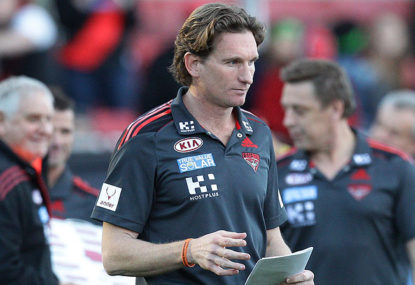If James Hird’s pithy excuse for a tell-all interview offered anything in the way of revelations – and it was spectacularly light in that regard – it was a look at the level of denial that has completely consumed the man.
With most of the hour dedicated to Hird reciting ad nauseam that “these 34 men are not drug cheats” and other similarly worded declarations, it wasn’t until the very end that the biggest hole in Hird’s logic was revealed.
It was a hole that would be immediately recognisable to a clearer mind.
Whenever Tracey Holmes actually cut to the chase and asked the single most important question of the four-year debacle, that small issue of what was in the needles, Hird’s reply was simple: only Stephen Dank knows.
And when finally pushed on whether that means it could have actually been banned substances, Hird almost casually stated that it was a possibility.
Incredibly, Holmes didn’t seize on this, which tells you all you need to know about the tenacity of the interview, and probably sent many remotes flying at televisions across Australia.
So viewers were denied the chance to hear Hird explain how this fits with his unshakeable belief that the players weren’t given banned drugs. The only brief justification given was that in his eyes, Dank had no reason to do so.
It was a staggeringly weak explanation which flew directly in the face of Hird’s countless stubborn pronouncements regarding drugs given to the players.
The problem for Hird is the same problem the players faced at the Court of Arbitration for Sport: the possibility they were given banned drugs is all that’s needed. It’s what’s landed them where they are today.
It’s not fair, it’s not just, and in the domestic realm of Australian football, it doesn’t make much sense. But it’s the rules.
Hird’s possibility passes the CAS’s low ‘comfortable satisfaction’ barrier to guilt. And if he’s genuine in his statements that the only person who truly knows what was injected is Dank, then he must eventually face that reality.
Dank’s amazing slip-up in April 2013, when he freely explained to journalist Nick McKenzie how he’d administered the infamous TB4 to Essendon players, says enough in itself. He later retracted it, stating he’d actually meant the legal Thymomodulin. But the unconvincing correction hardly removes the all-important possibility.
Hird isn’t stupid. The only probable explanation for his views is that the man is so blinded by feelings of injustice, so used to pleading the players’ absolute innocence, that he’s become engulfed by denial and actually come to believe it.
He desperately needs a dose of reality.
In 2012, Dank injected Essendon players with TB4. There’s no real suggestion that he did so knowing the drug had been banned, though it’s possible.
Likely, Dank made an error, enabled by a shocking lack of oversight at Essendon which ensured nobody properly checked or questioned his work – not Hird, not Hird’s mentor Mark Thompson, not CEO Ian Robson, not football manager Paul Hamilton, not doctor Bruce Reid and finally, not the players themselves.
If Hird can acknowledge that as a possibility, then by definition it must eventually skewer his denial that the players may well have taken banned drugs.
While that’s important for Hird, his future does lie outside football and thus he has time on his side to make that adjustment. Of more concern is the same attitude pervading through Essendon and the banned players. Because they don’t have that time.
Come November – which, though it may not seem like it, will arrive quickly – they’re required to resume their professional responsibilities. They’ve lost enough time already without doing themselves the double injustice of not being completely mentally ready to do so.
All denial will do now is delay the healing required for them to make a success of their returns. The players simply need to accept the facts: they put their trust in the wrong people, and have paid a shocking, perhaps draconian price for doing so. It’s not going to change now.
Hird said to Holmes he is still committed to doing whatever he can to help the players. If he truly has the courage of his convictions, then it’s absolutely impossible to understand how he hasn’t spent every night of the past three years camped on Dank’s front lawn demanding answers.
If he truly believes and wants to help, then that’s where he should be. Strangely, given a national television platform, when Dank was raised Hird didn’t make that plea. Instead, in a thoroughly baffling statement, he went as far as to defend the one man he says could have saved his beloved players from four years of hell, saying he doesn’t think Dank ever intended to cheat. As if that was even relevant.
One would think there were 34 men watching that who might have expected a slightly more aggressive attitude from their former coach.
Failing that, the best thing Hird can do to help is to stay the hell away from the players. He even suggested he could help them train, or work their way through their ban. That would be a calamity on top of a disaster.
In fact, the players could do worse than take a leaf from Hird’s book of suspension and disappear for a long European summer. Travel has a way of giving people perspective and restoring them mentally, and a trip of that nature is a luxury AFL players don’t usually get during their careers.
As the AFL’s nominated ‘head on a stake’ for the entire saga, Hird is tortured by his feelings of injustice and bitterness. To an extent, that’s justified. But all his presence can possibly do now is engender and strengthen those same feelings in the players, which will only delay their recovery – perhaps irretrievably.
Hird has time for that. The players don’t.





























































































